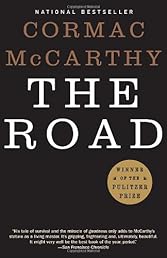
|
The Road (Oprah's Book Club)
|
||||||||||||||||||||
Buying Choices |
| 164 new from $4.25 |
| 895 used from $0.24 |
| 15 collectible from $9.00 |
(as of 2012-10-07 02:06:34 PST)
Description
NATIONAL BESTSELLERPULITZER PRIZE WINNERNational Book Critic's Circle Award FinalistA New York Times Notable BookOne of the Best Books of the YearThe Boston Globe, The Christian Science Monitor, The Denver Post, The Kansas City Star, Los Angeles Times, New York, People, Rocky Mountain News, Time, The Village Voice, The Washington PostThe searing, postapocalyptic novel destined to become Cormac McCarthy's masterpiece.A father and his son walk alone through burned America. Nothing moves in the ravaged landscape save the ash on the wind. It is cold enough to crack stones, and when the snow falls it is gray. The sky is dark. Their destination is the coast, although they don't know what, if anything, awaits them there. They have nothing; just a pistol to defend themselves against the lawless bands that stalk the road, the clothes they are wearing, a cart of scavenged food-—and each other.The Road is the profoundly moving story of a journey. It boldly imagines a future in which no hope remains, but in which the father and his son, "each the other's world entire," are sustained by love. Awesome in the totality of its vision, it is an unflinching meditation on the worst and the best that we are capable of: ultimate destructiveness, desperate tenacity, and the tenderness that keeps two people alive in the face of total devastation.| Check All Offers | Add to Wish List | Customer Reviews |
Editorial Review
Best known for his Border Trilogy, hailed in the San Francisco Chronicle as "an American classic to stand with the finest literary achievements of the century," Cormac McCarthy has written ten rich and often brutal novels, including the bestselling No Country for Old Men, and The Road. Profoundly dark, told in spare, searing prose, The Road is a post-apocalyptic masterpiece, one of the best books we've read this year, but in case you need a second (and expert) opinion, we asked Dennis Lehane, author of equally rich, occasionally bleak and brutal novels, to read it and give us his take. Read his glowing review below. --Daphne Durham
Guest Reviewer: Dennis Lehane
 Dennis Lehane, master of the hard-boiled thriller, generated a cult following with his series about private investigators Patrick Kenzie and Angela Gennaro, wowed readers with the intense and gut-wrenching Mystic River, blew fans all away with the mind-bending Shutter Island, and switches gears with Coronado, his new collection of gritty short stories (and one play).
Dennis Lehane, master of the hard-boiled thriller, generated a cult following with his series about private investigators Patrick Kenzie and Angela Gennaro, wowed readers with the intense and gut-wrenching Mystic River, blew fans all away with the mind-bending Shutter Island, and switches gears with Coronado, his new collection of gritty short stories (and one play). Cormac McCarthy sets his new novel, The Road, in a post-apocalyptic blight of gray skies that drizzle ash, a world in which all matter of wildlife is extinct, starvation is not only prevalent but nearly all-encompassing, and marauding bands of cannibals roam the environment with pieces of human flesh stuck between their teeth. If this sounds oppressive and dispiriting, it is. McCarthy may have just set to paper the definitive vision of the world after nuclear war, and in this recent age of relentless saber-rattling by the global powers, it's not much of a leap to feel his vision could be not far off the mark nor, sadly, right around the corner. Stealing across this horrific (and that's the only word for it) landscape are an unnamed man and his emaciated son, a boy probably around the age of ten. It is the love the father feels for his son, a love as deep and acute as his grief, that could surprise readers of McCarthy's previous work. McCarthy's Gnostic impressions of mankind have left very little place for love. In fact that greatest love affair in any of his novels, I would argue, occurs between the Billy Parham and the wolf in The Crossing. But here the love of a desperate father for his sickly son transcends all else. McCarthy has always written about the battle between light and darkness; the darkness usually comprises 99.9% of the world, while any illumination is the weak shaft thrown by a penlight running low on batteries. In The Road, those batteries are almost out--the entire world is, quite literally, dying--so the final affirmation of hope in the novel's closing pages is all the more shocking and maybe all the more enduring as the boy takes all of his father's (and McCarthy's) rage at the hopeless folly of man and lays it down, lifting up, in its place, the oddest of all things: faith. --Dennis Lehane
Book Details | ||||
| Author: Cormac McCarthy | Publisher: Vintage Books | Binding: Paperback | Language: English | Pages: 287 |
Comments |
Become a fan of Book Presence on Facebook for the inside scoop on latest and most exclusive books.




